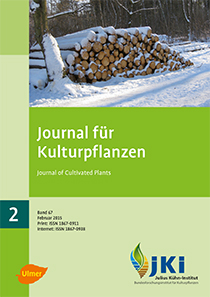Comparative investigation and inter-calibration of different soil P tests
Keywords:
Phosphorus, soil P tests, inter-calibrationAbstract
To allow the comparison and interpretation of data obtained by different soil P tests, different established extraction methods were investigated and statistically inter-calibrated. All soil P tests applied in this study were significantly correlated with each other. Their extracting force varied considerably, decreasing in the order PAR > PAL, PM3 ≥ PPAAAc-EDTA, PDL ≥ PCAL ≥ POlsen, PAAAc ≥ PW. Generally, it was possible to transform data from one soil P test into another one. However, the quality of the resulting values depended on the pair of soil tests at question. Based on the present set of data, values from CAL, AL, M3, AAAc-EDTA and water extracts showed strong correlations and consequently allowed for the calculation of highly significant regression equations with a strong coefficient of determination. While in some cases, simple regressions already yielded a coefficient of determination > 80%, in other cases additional soil parameters (such as soil-pH, ZnWH, FeWH, AlWH, CaWH and Ctotal) had to be included in order to achieve this high level of accuracy. In contrast, values obtained from extractions with NaHCO3 (Olsen), DL, and AAAc displayed weaker correlations. Accordingly, no satisfactory regression equations (i.e. with R2 > 80%) could be produced for these three methods. As major obstacles, differences in chemical composition, acidity and extraction force of the various extractants were identified.
DOI: 10.5073/JfK.2015.02.02, https://doi.org/10.5073/JfK.2015.02.02
Published
Issue
Section
License
The content of the journal is licensed under the Creative Commons Attribution 4.0 License. Any user is free to share and adapt (remix, transform, build upon) the content as long as the original publication is attributed (authors, title, year, journal, issue, pages).
The copyright of the published work remains with the authors. The authors grant the Journal of Cultivated Plants, the Julius Kühn-Institut and the OpenAgrar repository the non-exclusive right to distribute and exploit the work.







